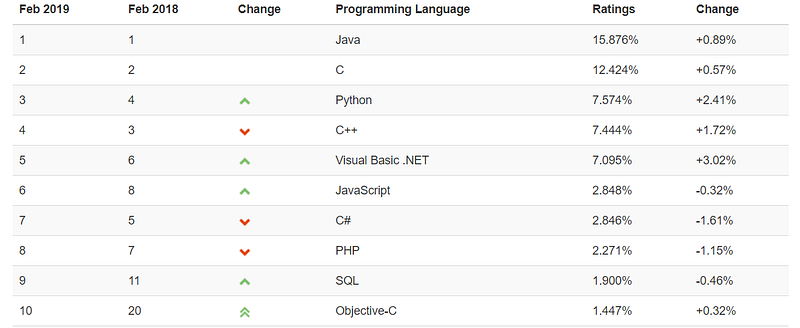50,000+ Free Udemy Courses to Start Today
View CoursesPicking a new programming language to learn is tricky. Whether you are a beginner or advanced, it helps to know what topics to learn. To cover for the basics of a programming language, its advanced concepts, and quick tricks if any. For this reason, QuickCode is starting a series where we'll be walking new learners on topics to focus when they begin learning a new programming language.
As a first in the series, we have picked to start with Python. Python has been steadily gaining ground to become one of the most popular programming languages of this decade, especially in the last 5 years. It's fast emerging as a language of choice in Data Science, for Artificial Intelligence, machine learning, computer vision, web applications, and web services. The number of job opportunities connected to the Python language has also been growing rapidly across the US, Europe, China, and India. Here's a screenshot from world's leading source of ranking of programming languages- Tiobe Index

Now that you are here and still reading, I am assuming that you had some basic interest in learning Python. On top of it we have also done our research and it's evident that learning Python as a programming language in 2019, is a good decision for a wide job market. Now without further ado, let's dive into a learning plan for Python:
Beginner Topics to focus on Python [Day 1 - 5]
1. Start with Command Line basics in Python [Installing, updating, running code]
2. Python Data Structures and Objects
3. Python Operators
4. Python Statements
5. Methods and Functions in Python
For beginners, you can check out one of the below Python courses listed on our platform QuickCode.
Learn Python for mastering machine learning, data science, big datawww.quickcode.co
Intermediate Topics to focus on Python [Day 6 - 11]
6. Object Oriented Programming in Python
7. Modules and Packages in Python
8. Error Handling And Exceptions
9. Python Decorators and Generators
Learn Python like a Professional! Start from the basics and go all the way to creating your own applications and games!www.quickcode.co
Advanced Topics to focus on Python [Day 12 - 17]
10. Collections in Python- Counter, DefaultDict, OrderDict, NamedTuple
11. Debugging in Python-pdb
12. Regular Expressions
13. StringIO
14. Advanced usage of Python Data Structures
15. GUIs with Python
Learn Python with projects covering game & web development, web scraping, MongoDB, Django, PyQt, and data…www.quickcode.co
Master the fundamentals of Python in easy steps - Free Course www.quickcode.co
Specialized Areas to develop projects with Python [Day 18 - 30]
16. Web Application Development with Python
In this video, I will cram as much as I can about the Python Django framework. We will talk about the framework and its…www.quickcode.co
17. Creating Bots with Python
The Ultimate Guide to start building Telegram Bots - Free Course www.quickcode.co
18. Data Science with Python
Learn to use powerful, open-source, Python tools, including Pandas, Git and Matplotlib, to manipulate, analyze, and… www.quickcode.co
19. Game Development with Python
Learn and Create a Snake game with Pygame in Python under 2 Hours! www.quickcode.co
20. Machine Learning with Python
Machine Learning with Python from IBM. This course dives into the basics of machine learning using an approachable, and… www.quickcode.co
21. Artificial Intelligence with Python
Wondering how python image recognition works? Wonder no more, you can learn artificial intelligence and python image… www.quickcode.co
Complementary Skills To Brush Up for a Job
Incidentally, the job market for programming is such that one language alone may not suffice all the requirements for a role. It needs to be paired with some complementing language or technical skills which would help you work in a company with multiple systems. So in order to increase your job chances, you would want to pair them with at least one (if not more) additional language skills for coding:
- Basic HTML, CSS ( for web development)
- Basic Javascript, Jquery (for web development)
- Basic SQL (must have for any role)
- Statistics (for Data Analyst roles)
- Linear Algebra (for Machine Learning roles)
If you need to revise any of the above courses, you can search for one of the free courses on our same platform here.
Popular Job Roles To Target with Python
We all want to achieve something after learning something, especially something as rigorous as programming. It is no secret that most of the jobs of the future will be centered around computer programming, coding, and other related skills. Of course, many learn out of their own interest or to make their own applications. But if you are someone looking for a job after a significant learning effort, then these are some of the job roles you can target with Python:
- Data Analyst
- Data Scientist
- Python Django Developer
- Python Web Developer
- Senior Python Developer
- AI Software Engineer with Python
- Machine Learning Engineer Python
Conclusion
This article is a first in our new series of 'Learning Plan', to help students learn a new language in a stepwise manner. It's an initiative we are taking based on the pain points we uncovered after talking to some of our users. We figured it would help students to have some example courses to look for whenever interested in a topic of their choice. Also as a next step what other complementary skills they might need when targeting a particular job role in mind.
However, there's always a scope to do better. So it is awesome if you would like to share any ideas to help us plan our next article better. Be it the next 'Learning Plan' in the same series, or some other type of article where we can help better. Quickcode will be grateful for your ideas, appreciation, and feedback of any kind.